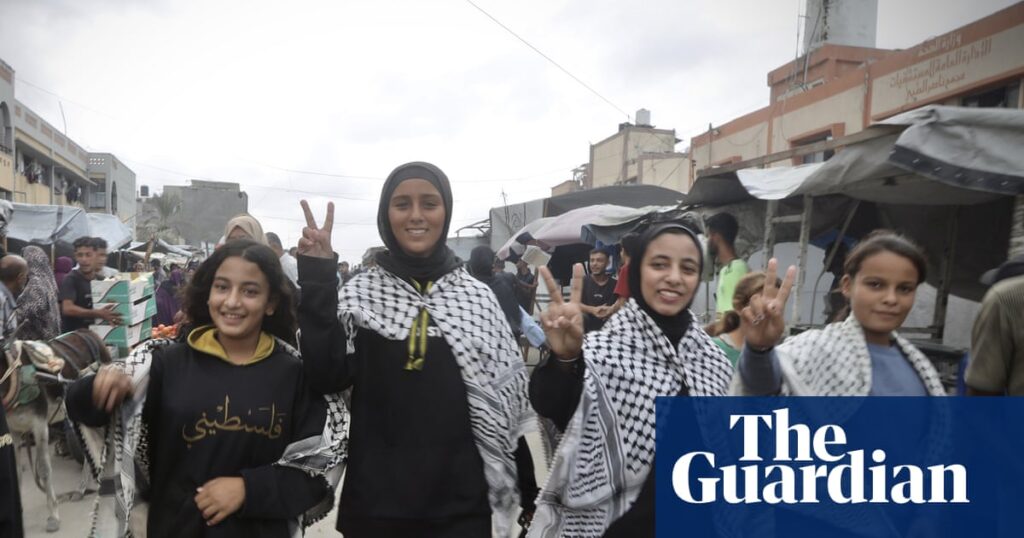On Thursday morning, there was little joy in Gaza. The news of the imminent ceasefire had spread rapidly across the devastated territory during the night, with a few gunshots fired into the sky in celebration, but as morning came the mood was of tense anticipation.
“Everyone is still afraid,” said a 26-year-old woman in al-Mawasi, the squalid, overcrowded coastal strip where much of the population has sought shelter in makeshift tents and plastic shacks.
Nearby, Abbas Hassouna, 64, said he and his family were “waiting for an official announcement and real guarantees for opening the crossings, bringing in food, and stopping the killing, destruction and displacement”.
“When we see these things happen, only then will we truly believe them. But for now, fear remains. They could backtrack at any moment or break the agreement as before and we will remain in the same endless cycle with nothing changing except more suffering,” said Hassouna, who is from northern Gaza but has been displaced several times.
Ola al-Nazli, 47, said she had learned of the ceasefire from her neighbours in al-Mawasi. “I did not know how to feel, whether to be happy or sad. We have experienced this many times before, and each time we were disappointed again, so this time fear and caution are stronger than ever,” said Nazli, who was forced to leave her home in Gaza City by the recent Israeli offensive there.
“Everyone lives in tents that do not protect from the cold or from the bombing. Those who had money or work lost everything. That is why our happiness is mixed with pain and fear. I only hope that we can live in safety, not hear the sound of bombs again, not be forced to move from one place to another, and that the crossings will open soon,” said Nazli.
Aid agencies said they were preparing to “flood” Gaza with food and other essential supplies. The 20-point plan proposed by Donald Trump provides for a surge of humanitarian assistance. The World Health Organization chief, Tedros Adhanom Ghebreyesus, said his agency was prepared to “scale up its work to meet the dire health needs of patients across Gaza, and to support rehabilitation of the destroyed health system”.
The UN agency for Palestinian refugees, Unrwa, welcomed the deal as a “huge relief”, and said it had enough food stockpiled outside Gaza to provide for the devastated territory’s 2.3m population for the coming three months. Though more aid has reached Gaza in recent weeks, quantities are still grossly insufficient, humanitarian workers said.
Jihad al-Hilu heard the news of the ceasefire on a radio while sitting in his tent in al-Mawasi. “At that moment, I felt a mix of joy and relief, as if some hope had returned to my heart after a long wait. We were longing for this moment, for the blood to stop and for the massacres that have broken so many homes to end,” Hilu, 33, told the Guardian.
“At the same time, there is a great fear that lives within us. We worry that this truce might be temporary and that the war could return as it did before.”
There are also widespread concerns about what peace may bring to Gaza, where more than 90% of homes have been damaged or destroyed, almost all infrastructure destroyed and where much of the population goes hungry every day. More than 67,000 Palestinians, mostly civilians, have been killed by the Israeli offensive launched in the aftermath of the Hamas raid in October 2023, which killed 1,200, also mostly civilians, and saw 251 taken hostage by militants.
“What worries me more than anything is the lack of security. Hunger can be endured, but the absence of safety is the real disaster. I fear that Gaza could turn into a place of chaos ruled by gangs and militias instead of law and order,” Hilu said.
Witnesses said Israeli forces fired tank shells to prevent Palestinians returning to northern parts of Gaza on Thursday morning but reported no sounds of fighting or airstrikes.
Nadra Hamadeh, whose sister, brother-in-law, two nieces and son in law were killed in the war, said she hoped to return from al-Mawasi to northern Gaza as soon as possible to check on her home, which she believes to be damaged but not destroyed.
“My heart is heavy for those who lost their families and children and homes … As for us, we look forward to returning to our home that we had to leave behind. It feels still as if our souls were taken from our bodies when we left,” Hamadeh, 57, said.
“Our hope is that the war ends, Gaza will be rebuilt with its people and residents, and families will be reunited … I only ask that the people return to their homes as they were before this two-year war and that Gaza recovers and is returned to its people.”

